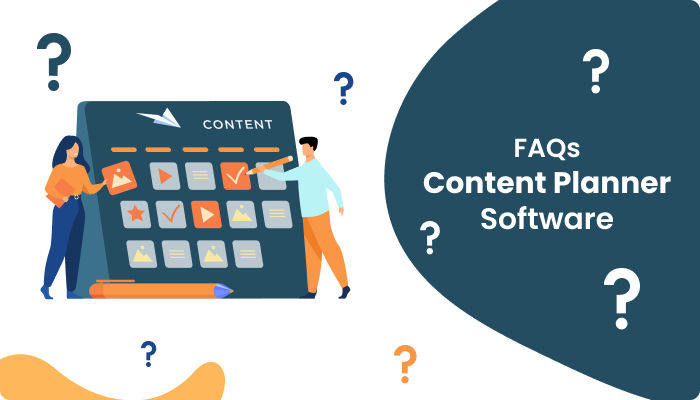Content Planning Software has evolved into a crucial element of any effective marketing plan in the modern digital environment. Businesses continuously produce and distribute content to engage their audience and provide results, including blog articles, videos, social media posts, and email newsletters. However, with so much content being created, it can be challenging to keep track of it all and make sure it complements your marketing objectives. Tools for content planning can help with it.
In this article, we’ll address some of the most common queries concerning it and describe how they can help organizations boost the effectiveness and efficiency of their content marketing initiatives. This article will give you the knowledge you need to select the ideal for your company, regardless of your level of experience with content marketing.
1. What is a content planning tool and how does it work?
A software program known as content planning aids companies and marketers in organizing, planning, and carrying out their content marketing initiatives. A content calendar, keyword research, SEO optimization, collaborative tools, analytics and reporting, and other capabilities are frequently included.
It works by providing a single location for all content marketing tasks, such as creating a calendar, choosing keywords, tracking their performance, and more. Additionally, users can assign tasks, set deadlines, and collaborate with other team members. Additionally, it can offer data and insights to users so they can assess how well their material is performing and adjust their strategy as necessary. A planning tool generally promotes efficiency and production.
2. How can a content planning tool help in improving content marketing strategy?
A content planning tool can help improve a content marketing strategy in several ways:
- Content Calendar: Users can also establish an information calendar that specifies the timetable for producing disseminating, and promoting content with the use of a content planning tool. Users can use this to prepare ahead of time and make sure they consistently post high-quality content that supports their marketing objectives.
- Keyword Research: Researching and Choosing Keywords: It can assist users in finding and choosing keywords that support their content marketing objectives. Users who do this can improve the search engine optimization of their content and boost traffic.
- SEO Optimization: Meta tags and other on-page optimization options are common elements in content planning that assist users in optimizing their content for search engines. This may aid in raising their profile and increasing traffic to their material.
- Collaboration: Using a planning tool, users may assign tasks to team members set deadlines, and monitor progress. This can increase productivity and guarantee that everyone on the team is working toward the same goals.
- Analytics and reporting: Users can access analytics and reporting capabilities from a tool to better understand the effectiveness of their content. This can assist users in determining what is working well and what needs to be improved so they can make the necessary adjustments.
3. Can a content planning tool help with SEO and keyword research?
Undoubtedly, a content planning tool may aid in keyword and SEO research. Numerous content planning solutions come with functions that help users with keyword and SEO research.
When it comes to SEO, content planning software can assist users by offering capabilities like on-page optimization choices, meta tag development, and administration, and broken link monitoring.
A content planning tool can assist users in finding pertinent keywords that are consistent with their content marketing objectives. Additionally, it can offer consumers information on search traffic, competition, and trends that can assist users in choosing the best keywords to target.
4. How do I choose the right content planning tool for my business?
Choosing the right tool for your business can be a challenging task, but it is crucial to ensure that the tool aligns with your content marketing goals and is a good fit for your business. Here are some key factors to consider when choosing it.
Features: By considering the elements you specifically require, like a content calendar, keyword research, SEO optimization, collaboration tools, analytics and reporting, and more. Check to see if the tool has all the capabilities you require for effective planning and implementation of your content marketing strategy.
Integration: Determine whether the product can be used in conjunction with other programs and platforms that you already use, including social media, marketing automation software, and your website. By doing this, you can be confident that the tool will flow naturally into your current workflow.
Scalability: You can take into account whether the tool can be scaled to meet your business’s needs as it expands. It ought to be able to handle the growing amount of team members and content.
User-Friendliness: Assess the tool’s user interface to ensure sure it is simple to use and navigate. You want a product that is simple to use, intuitive and requires little training for your team members to use.
Budget: Take into account the tool’s price and make sure it is within your limits. Find a tool that provides a decent balance between functionality and price.
Support: Examine the degree of support provided by the tool’s manufacturer. Make sure they provide enough aid and support in case you run into any problems.
5. Can a content planning tool integrate with other marketing tools and platforms?
Yes, many ai writing generators can integrate with other marketing tools and platforms. This can help streamline your workflow and improve efficiency. Some examples of integrations that a tool may offer include:
- Website: To automatically publish and schedule content, several content planning solutions can be integrated with your website’s CMS (content management system).
- Marketing Automation: To send out newsletters and other email campaigns automatically some content planning platforms can link with marketing automation tools like MailChimp.
- Social media: To automatically post and schedule social media content, certain content planning software can link with social media sites like Facebook, Twitter, and LinkedIn.
- Analytics: You can get information on the performance and user interaction of your website by integrating some planning tools with analytics tools like Google Analytics.
- CRM: Some content planning systems may interface with CRM platforms, like Salesforce, to give you details on the demographics, behavior, and purchasing patterns of your customers.
- eCommerce: You can get data on your sales success, customer journeys, and purchasing patterns by integrating some content planning software with eCommerce platforms like Shopify or Appy Pie’s App Maker.
It’s crucial to keep in mind that the degree of integration may vary based on the tool you select, so before choosing one be sure to look into the precise integrations that each tool provides.
6. How much does a content planning tool cost?
A content planning tool’s price might differ significantly based on its features, scalability, and degree of support. Other content planning tools need a monthly or yearly subscription, while some are free or have a free version with fewer functionality.
Here are some examples of the pricing structures provided by some well-known content planning tools:
- Free: A free version with fewer capabilities is available for several planning tools. Small organizations or individuals that are just getting started with content marketing might consider using these free versions.
- Freemium: Some content planning software provides a basic version that is feature-limited for free but charges extra for more features or increased usage.
- Monthly or yearly membership: Depending on the number of users or the volume of content you intend to manage, some content planning solutions are available for a monthly or yearly subscription.
- Custom pricing: Based on the unique requirements of your company, several content planning solutions provide custom pricing.
7. How does content planning software help with content creation and editing?
A content planning tool can help with content creation and editing in several ways:
- Content Calendar: Users can establish an information calendar that specifies the timetable for producing, sharing, and promoting content with the use of a content planning tool. Users can use this to prepare ahead of time and make sure they consistently post high-quality content that supports their marketing objectives.
- Collaboration: By Using a planning tool, users may assign tasks to team members, set deadlines, and monitor progress. This can increase productivity and guarantee that everyone on the team is working toward the same goals.
- Templates: A number of content planning platforms provide pre-made templates for various sorts of content, including blog posts, social media updates, and email campaigns. By doing this, users can save time and make sure the formatting and style of their content are consistent.
- Workflow: Some content planning solutions have a feature called workflow that makes it simple for users to move information between stages of the development process, like drafting, editing, and publishing. By doing so, you may increase efficiency and guarantee that all information is authorized before it is published.
- Version Control: Some content planning solutions offer version control features that let users monitor edits to a piece of content and roll back to earlier iterations as needed. Users can use this to make sure that only the most recent and accepted version of a piece of content is published.
8. What types of content can be planned and organized using a content planning tool?
A content planning tool can be used to plan and organize a variety of different types of content, including:
- Blog Posts, Social Media Posts, Email Campaigns, Videos, Whitepapers and e-books, Case Studies and Research Reports, Infographics, Podcasts, Webinars, Landing pages
9. How can a content planning tool help with tracking and measuring ROI?
Content planning software can help with tracking and measuring the return on investment (ROI) of your content marketing efforts in several ways:
- Analytics, Link tracking, Goal-setting and conversion tracking, A/B testing, Lead scoring, Custom metrics
10. How does content planning software help with creating and implementing a content strategy?
A content planning tool can help with creating and implementing a content strategy in several ways: Content Calendar, Finding and Selecting Keywords, Targeting, Workflow, Collaboration, Analytics and reporting
Winding Up
Content planning tools are essential for businesses that want to effectively execute their content marketing strategy. They help users create a content calendar, conduct keyword research, target specific audiences, streamline the content creation process, collaborate with team members, and track the performance of their content.
When choosing content planning software, it is important to consider factors such as cost, integration with other marketing tools and platforms, and features such as analytics and reporting. With the right content planning tool like NinjaContent from 500apps, businesses can improve the efficiency and effectiveness of their content marketing efforts, and measure their return on investment. Whether you are a small business or a large enterprise, a content planning tool can help you create and implement a content strategy that drives results.



